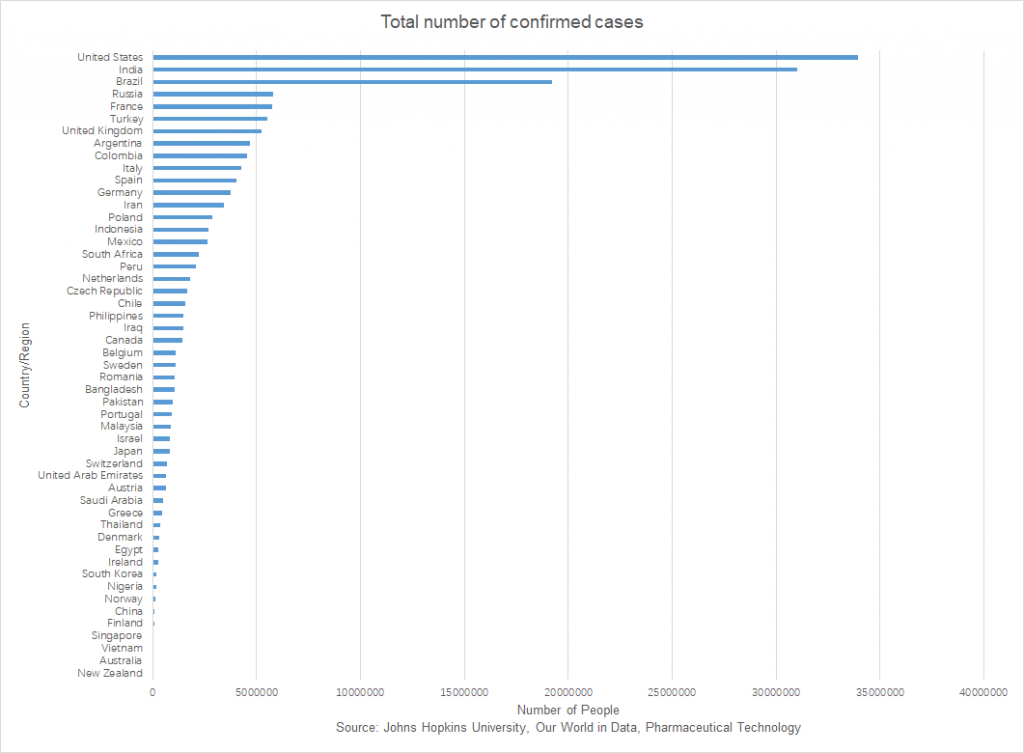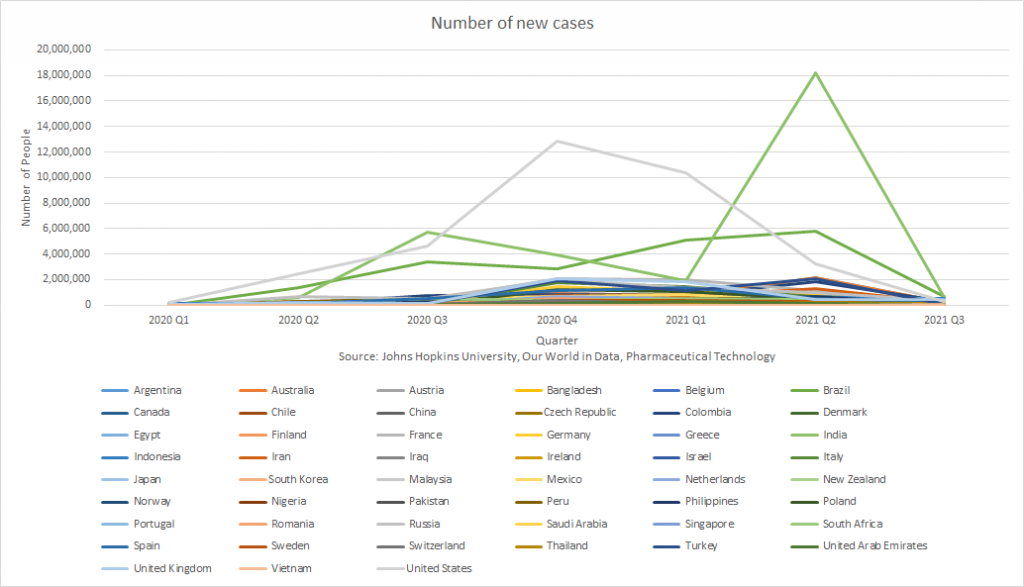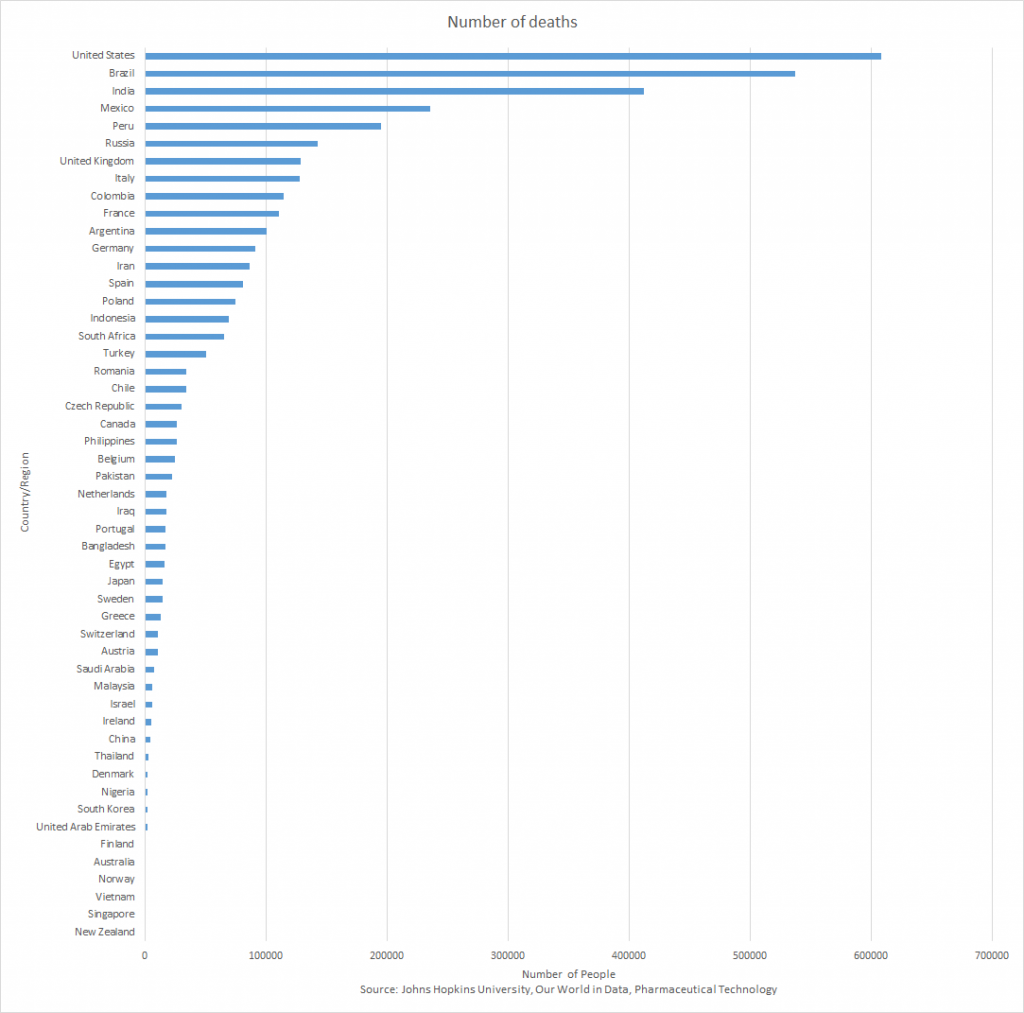Foreign news
CGTN Think Tank releases an analytical report on the global situation of the COVID-19 pandemic

As the global spread of the COVID-19 pandemic has not yet subsided, the CGTN Think Tank has released the Analytical Report on the Global Situation of the COVID-19 Pandemic (the “Report”) by sourcing data from the Johns Hopkins University website, Our World in Data and Pharmaceutical Technology that have not been comprehensively processed, analyzing research literature from the academic community and referring to the known impact of the pandemic on global economic and social development as well as the recommendations on its prevention and control from renowned public health experts.
The Report puts together the data on pandemic prevention and control measures in 51 sample countries to make rankings as a way of reflecting the current situation of pandemic control in these countries. It focuses on the importance that countries attach to personal safety, social and environmental stability, thereby providing ideas and directions for countries around the world to fight the pandemic.
The Report analyzes and evaluates the current status of pandemic prevention and control in the 51 countries based on five indicators, including the total number of confirmed cases, the number of newly confirmed cases, the total number of deaths, the number of vaccinations and the full cycle from pandemic outbreak to control as of 14 July.
The data shows that the United States has the worst performance on three of the five statistical indicators. The U.S. has over 34 million confirmed cases in total, the highest in the world, and over 600,000 deaths in total, also the highest in the world; and the number of days with less than 5,000 daily new cases in the full cycle from pandemic outbreak to control is only 62, still the worst among the sample countries.
According to the data, the situation in main European countries is not encouraging. When it comes to the total number of confirmed cases and deaths, France, the UK and Italy all rank high.
The data shows that some Asian countries have performed well in pandemic prevention and control, thanks to effective measures such as entry bans, quarantine and stringent testing at the border. China has the lowest number of confirmed new cases among the sample countries and the highest number of vaccinations in the world; Singapore and Vietnam rank low among all sample countries for the total number of COVID-19 deaths; and South Korea has adjusted the level of pandemic response in a timely manner, resulting in 537 days with less than 5,000 daily new cases.
In terms of the number of vaccinations, China is one of a few developing countries with the highest number of COVID-19 vaccinations due to its ability to develop and manufacture its own vaccines. At present, over 1.4 billion doses of COVID-19 vaccines have been administered in China. China has also supplied more than 500 million doses of COVID-19 vaccines and stock solutions to more than 100 countries and international organizations worldwide, equivalent to one-sixth of the total global vaccine production.
However, the statistics also lay bare that the vaccination progress in developing countries is significantly worse than that in developed countries, due to the severe inequality in the global distribution of vaccines. Countries with a poor vaccination record, such as Vietnam and Iraq, are still far from reaching herd immunity due to various limitations, such as poor health service and vaccine hoarding by certain developed countries.
The polarization in the number of confirmed cases, the number of deaths and the number of people vaccinated in different countries and regions of the world, as shown by the objective statistics, is very much related to national pandemic prevention and control policies and measures, and highlights the crucial role played by a country’s government in pandemic prevention and control.



Featured
Financing Health Futures: Nigeria, Ghana, Uganda Turn to Tobacco and Telecom Taxes in Big Push Against Malaria

African leaders, parliamentarians, health experts, and development partners have renewed their commitment to ending malaria by 2030, with a bold call for domestic financing through innovative taxation on tobacco, alcohol, and telecom services to close critical funding gaps.
The discussions took center stage at the Big Push Against Malaria: Harnessing Africa’s Role high-level political engagement in Abuja, where Nigeria, Ghana, and Uganda showcased new homegrown financing strategies aimed at reducing dependence on dwindling donor support.
Africa’s Heavy Burden
Malaria remains one of Africa’s deadliest diseases. In 2023, the world recorded 263 million cases and nearly 600,000 deaths, with 94% of cases and 95% of deaths occurring in Africa. Nigeria alone accounted for 26.6% of global cases and 31% of deaths, according to the World Malaria Report 2024. Children under five remain the most vulnerable, making up 76% of deaths.
Despite progress — with Nigeria cutting malaria deaths by more than half since 2000 through insecticide-treated nets, preventive treatments, and the rollout of the new R21 malaria vaccine — leaders warned that global targets are off-track. The World Health Organization’s technical strategy for malaria (2016–2030) has stalled since 2017, with Africa unlikely to meet its 2025 and 2030 milestones without urgent action.
Taxing for Health Futures
The Nigerian Parliament’s Committee on HIV/AIDS, Tuberculosis, and Malaria (ATM) announced plans to fund malaria elimination through “sin taxes” and telecom levies.
According to the House Chair on ATM, Hon. Linda Ogar, a bill is underway to restructure the National Agency for the Control of AIDS (NACA) into a multi-disease agency that will address HIV, TB, and malaria.
The new financing mechanism proposes:
Taxes on tobacco, alcohol, and other luxury items
Dedicated levies on telecom airtime and mobile money transactions
A percentage of the nation’s consolidated revenue
“These resources will provide sustainable funding to strengthen health systems and accelerate malaria elimination,” Ogar said, stressing that Africa must stop relying solely on foreign donors. “We cannot continue to take two steps forward and five steps backward. Africa must begin to show the world that we are ready to solve our problems ourselves.”
Similar models are already being piloted in Ghana and Uganda, where levies on mobile money and telecoms are being redirected to finance health interventions. The Abuja meeting urged other African countries to adopt this approach as part of a continental framework for sustainable financing.
Leaders Call for Urgent Action
Nigeria’s Minister of State for Health and Social Welfare, Dr. Iziaq Adekunle Salako, emphasized that while malaria is preventable and treatable, it still kills hundreds of thousands yearly due to funding shortfalls, climate change, insecticide resistance, and humanitarian crises.
“To truly defeat this disease, we must rethink, join forces, and mount a concerted ‘Big Push’. Funding gaps remain a major obstacle, and innovative domestic financing is the way forward,” Salako declared.
From the civil society front, grassroots representatives pledged to act as “foot soldiers”, demanding that communities have a seat at the decision-making table. The World Health Organization, Bill & Melinda Gates Foundation, Aliko Dangote Foundation, and other partners reaffirmed support but stressed the need for stronger political will and local ownership.
Private Sector and Global Support
Representing billionaire philanthropist Aliko Dangote, the Nigeria Malaria Council reiterated that private sector investment must complement government financing. Meanwhile, the Global Fund confirmed it has invested nearly $2 billion in Nigeria’s malaria response and committed an additional $500 million for 2024–2026, including support for local production of malaria drugs.
The Gates Foundation’s Uche Anaowu noted that while progress has slowed, malaria remains beatable:
“Smallpox is the only human disease ever eradicated. The question is — can malaria be next? I believe Africa has both the burden and the opportunity to lead the world in making that happen.”
Financing Health Futures: Nigeria, Ghana, Uganda Turn to Tobacco and Telecom Taxes in Big Push Against Malaria
Abuja, Nigeria – African leaders, parliamentarians, health experts, and development partners have renewed their commitment to ending malaria by 2030, with a bold call for domestic financing through innovative taxation on tobacco, alcohol, and telecom services to close critical funding gaps.
The discussions took center stage at the Big Push Against Malaria: Harnessing Africa’s Role high-level political engagement in Abuja, where Nigeria, Ghana, and Uganda showcased new homegrown financing strategies aimed at reducing dependence on dwindling donor support.
Africa’s Heavy Burden
Malaria remains one of Africa’s deadliest diseases. In 2023, the world recorded 263 million cases and nearly 600,000 deaths, with 94% of cases and 95% of deaths occurring in Africa. Nigeria alone accounted for 26.6% of global cases and 31% of deaths, according to the World Malaria Report 2024. Children under five remain the most vulnerable, making up 76% of deaths.
Despite progress — with Nigeria cutting malaria deaths by more than half since 2000 through insecticide-treated nets, preventive treatments, and the rollout of the new R21 malaria vaccine — leaders warned that global targets are off-track. The World Health Organization’s technical strategy for malaria (2016–2030) has stalled since 2017, with Africa unlikely to meet its 2025 and 2030 milestones without urgent action.
Taxing for Health Futures
The Nigerian Parliament’s Committee on HIV/AIDS, Tuberculosis, and Malaria (ATM) announced plans to fund malaria elimination through “sin taxes” and telecom levies.
According to the House Chair on ATM, Hon. Linda Ogar, a bill is underway to restructure the National Agency for the Control of AIDS (NACA) into a multi-disease agency that will address HIV, TB, and malaria.
The new financing mechanism proposes:
Taxes on tobacco, alcohol, and other luxury items
Dedicated levies on telecom airtime and mobile money transactions
A percentage of the nation’s consolidated revenue
“These resources will provide sustainable funding to strengthen health systems and accelerate malaria elimination,” Ogar said, stressing that Africa must stop relying solely on foreign donors. “We cannot continue to take two steps forward and five steps backward. Africa must begin to show the world that we are ready to solve our problems ourselves.”
Similar models are already being piloted in Ghana and Uganda, where levies on mobile money and telecoms are being redirected to finance health interventions. The Abuja meeting urged other African countries to adopt this approach as part of a continental framework for sustainable financing.
Leaders Call for Urgent Action
Nigeria’s Minister of State for Health and Social Welfare, Dr. Iziaq Adekunle Salako, emphasized that while malaria is preventable and treatable, it still kills hundreds of thousands yearly due to funding shortfalls, climate change, insecticide resistance, and humanitarian crises.
“To truly defeat this disease, we must rethink, join forces, and mount a concerted ‘Big Push’. Funding gaps remain a major obstacle, and innovative domestic financing is the way forward,” Salako declared.
From the civil society front, grassroots representatives pledged to act as “foot soldiers”, demanding that communities have a seat at the decision-making table. The World Health Organization, Bill & Melinda Gates Foundation, Aliko Dangote Foundation, and other partners reaffirmed support but stressed the need for stronger political will and local ownership.
Private Sector and Global Support
Representing billionaire philanthropist Aliko Dangote, the Nigeria Malaria Council reiterated that private sector investment must complement government financing. Meanwhile, the Global Fund confirmed it has invested nearly $2 billion in Nigeria’s malaria response and committed an additional $500 million for 2024–2026, including support for local production of malaria drugs.
The Gates Foundation’s Uche Anaowu noted that while progress has slowed, malaria remains beatable:
“Smallpox is the only human disease ever eradicated. The question is — can malaria be next? I believe Africa has both the burden and the opportunity to lead the world in making that happen.”
The Big Push: From Talk to Action
Speakers acknowledged that Africa has hosted too many malaria meetings without concrete outcomes. This time, however, leaders insisted the Abuja gathering must mark a turning point — from dependency to self-reliance.
With Nigeria, Ghana, and Uganda setting the pace on tax-based health financing, the continent now faces the challenge of replicating and scaling up these models.
“Now that Africa is at a critical point, the need for a Big Push against malaria cannot be overemphasized. If we align political will, innovative financing, and community engagement, we can end malaria within our lifetime.”
Nigeria, Ghana, and Uganda are pioneering a shift from donor dependence to domestic revenue mobilization via tobacco, alcohol, and telecom taxes — a model hailed as central to financing Africa’s health futures and ending malaria by 2030
Speakers acknowledged that Africa has hosted too many malaria meetings without concrete outcomes. This time, however, leaders insisted the Abuja gathering must mark a turning point — from dependency to self-reliance.
With Nigeria, Ghana, and Uganda setting the pace on tax-based health financing, the continent now faces the challenge of replicating and scaling up these models.
“Now that Africa is at a critical point, the need for a Big Push against malaria cannot be overemphasized. If we align political will, innovative financing, and community engagement, we can end malaria within our lifetime.”
Nigeria, Ghana, and Uganda are pioneering a shift from donor dependence to domestic revenue mobilization via tobacco, alcohol, and telecom taxes — a model hailed as central to financing Africa’s health futures and ending malaria by 2030
-

 Featured6 years ago
Featured6 years agoLampard Names New Chelsea Manager
-

 Featured6 years ago
Featured6 years agoFG To Extends Lockdown In FCT, Lagos Ogun states For 7days
-

 Featured6 years ago
Featured6 years agoChildren Custody: Court Adjourns Mike Ezuruonye, Wife’s Case To April 7
-

 Featured6 years ago
Featured6 years agoNYSC Dismisses Report Of DG’s Plan To Islamize Benue Orientation Camp
-

 Featured4 years ago
Featured4 years agoTransfer Saga: How Mikel Obi Refused to compensate me After I Linked Him Worth $4m Deal In Kuwait SC – Okafor
-
Sports3 years ago
TINUBU LAMBAST DELE MOMODU
-

 News10 months ago
News10 months agoZulu to Super Eagles B team, President Tinubu is happy with you
-
Featured6 years ago
Board urges FG to establish one-stop rehabilitation centres in 6 geopolitical zones
